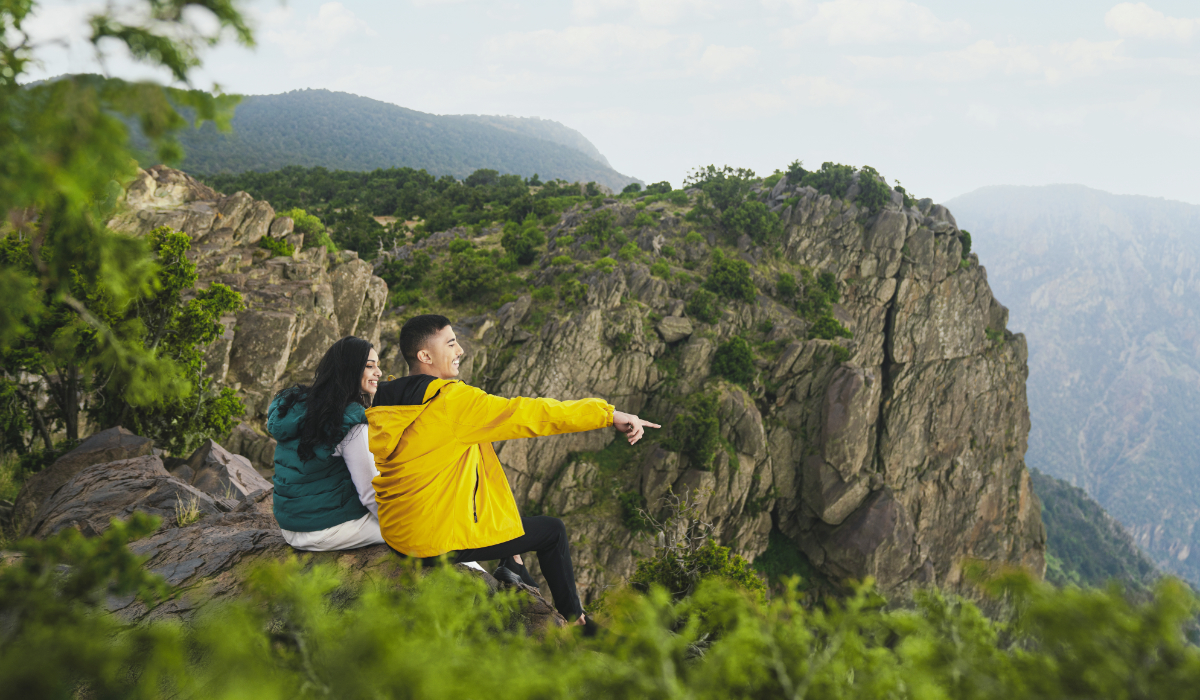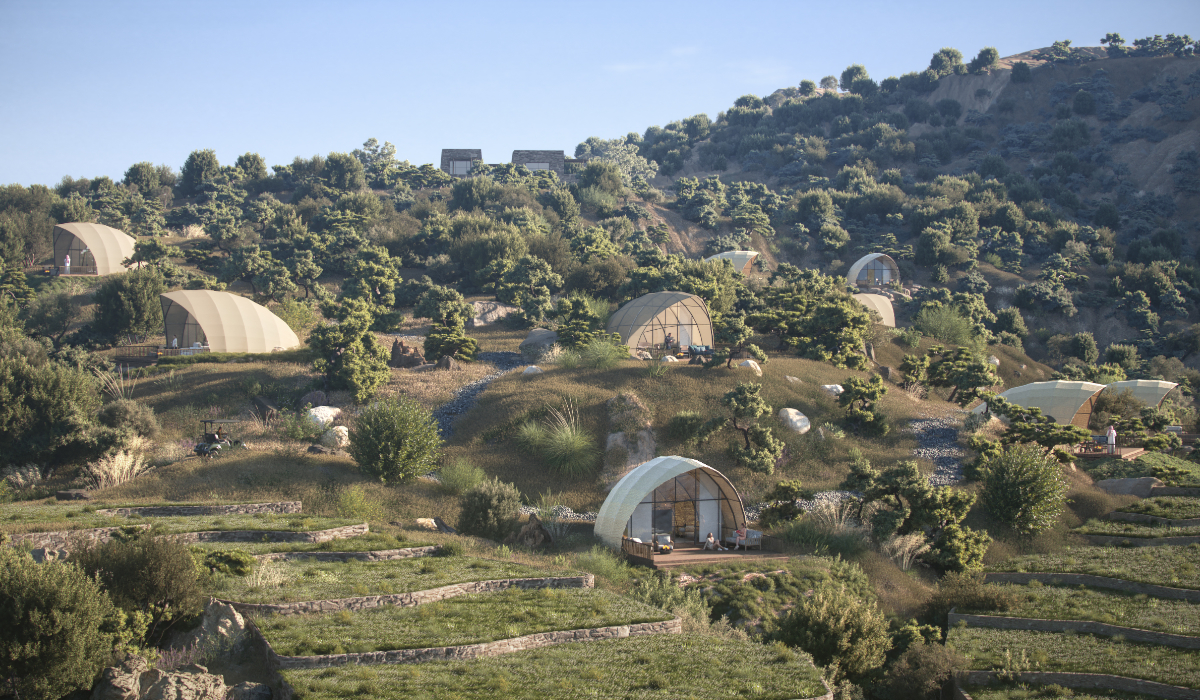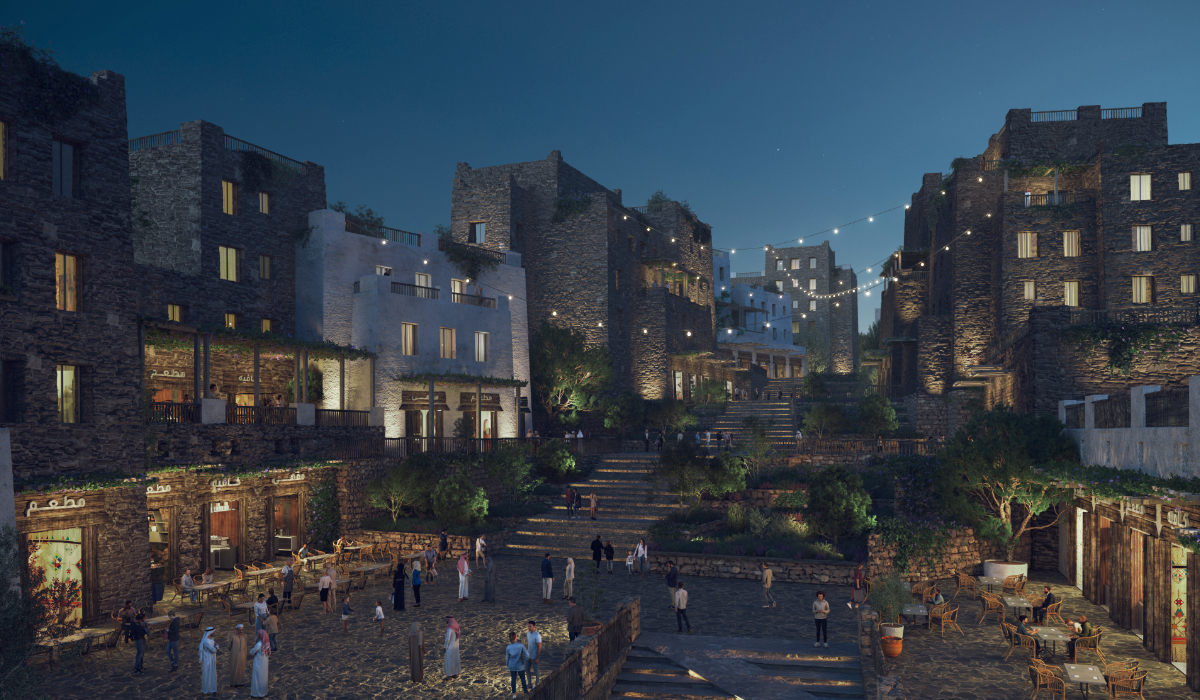RIYADH: Soudah Peaks, a sustainable luxury mountain destination under construction by the Public Investment Fund’s Soudah Development, lies in the southwest region of Saudi Arabia.
It stands 3,015 meters above sea level — the highest point in the Kingdom — and will offer adventurers, thrill-seekers, and lovers of serenity a special place in Aseer.
“Soudah Development and Soudah Peaks, as a destination that our company has been developing under the ownership of the Public Investment Fund … we believe, has done something very, very important,” said Srdan Susic, chief sustainability officer at Soudah Development. “Out of 630 sq. km under Soudah Development, we are developing only a small portion of it. So, the built footprint is not going to be very, very large.”
He added 28 percent of the land being used has been placed under numerous forms of natural protection.
Daniel McBrearty, chief development officer for the company, said: “The masterplan for Soudah Peaks epitomizes meticulous design within a sustainable environmental framework, reflecting an unwavering commitment to responsible development. Acknowledging the region’s rich biodiversity, Soudah Development is dedicated to preserving and nurturing these invaluable assets.”

Visitors and residents will have abundant opportunities to enjoy Soudah Peaks with year-round outdoor activities in the clean, cool mountain air, from mountain trails and hiking paths to paragliding, mountain biking, horse riding, and zip-lining. (Supplied)
Susic added that this information is important for the PIF-backed developer to enhance and extend protective coverage of the area.
“We are very keen on restoring around 19 priority cultural heritage sites. The ecosystems around us have been very productive in the past, and this allowed the local communities to build significant assets like old houses, old palaces, old mosques, old integrated villages … some of them we hope to see on UNESCO’s World Heritage Sites list,” he said.
Part of these efforts include a partnership with the National Center for Wildlife, which witnessed the recent release of 10 Arabian mountain gazelles into the wild, with the aim of reintroducing more wildlife to enhance biodiversity.
HIGHLIGHTS
• Part of these efforts include a partnership with the National Center for Wildlife, which witnessed the recent release of 10 Arabian mountain gazelles into the wild, with the aim of reintroducing more wildlife to enhance biodiversity.
• As well as support endangered animals, the developers’ environmental initiatives will plant 1 million trees by 2030 and rehabilitate parks and forests to enhance vegetation cover, conserve biodiversity and restore ecosystems.
As well as support endangered animals, the developers’ environmental initiatives will plant 1 million trees by 2030 and rehabilitate parks and forests to enhance vegetation cover, conserve biodiversity and restore ecosystems.
Visitors and residents will have abundant opportunities to enjoy Soudah Peaks with year-round outdoor activities in the clean, cool mountain air, from mountain trails and hiking paths to paragliding, mountain biking, horse riding, zip-lining and more. An 18-hole golf course will sit atop the Soudah plateau with stunning views and average temperatures of 20 C.
The serene settings will offer nature lovers a chance to enjoy national parks, a network of hiking trails, local farms and find harmony with nature through a collection of luxury wellness experiences including exclusive eco-spa resorts, meditation centers and yoga retreats.

Visitors and residents will have abundant opportunities to enjoy Soudah Peaks with year-round outdoor activities in the clean, cool mountain air, from mountain trails and hiking paths to paragliding, mountain biking, horse riding, and zip-lining. (Supplied)
Soudah is also home to a rich tapestry of traditional folk music, poetry, art, locally produced honey, coffee farms and local customs passed down over generations. There are more than 200 documented heritage sites, from hamlets, mosques and minarets to watchtowers and mountain forts, and many will be considered for inclusion on the UNESCO List of World Heritage Sites.
There will also be 80,000 square meters of retail area, more than 30 additional attractions, 1,336 residential units, and 2,700 hospitality keys.
“The project encompasses six unique districts — Tahlal, Sahab, Sabrah, Jareen, Rijal, and Red Rock — each offering world-class facilities, from hotels, luxury mountain resorts, and chalets to villas, premium residential units, and diverse entertainment options,” said McBrearty.
Soudah Development and Soudah Peaks, as a destination that our company has been developing under the ownership of the Public Investment Fund … we believe, has done something very, very important.
Srdan Susic, Chief sustainability officer at Soudah Development
“Each district is curated with a different emphasis to cater to sports, adventure, wellness, and cultural enthusiasts. Soudah Peaks’ development is structured across three phases … (with) phase one encompassing over 940 hotel keys, 340 residential units, and 32,000 square meters of retail space.”
Tahlal will serve as the primary hub for tourists, offering upscale dining and shopping, hospitality, entertainment, and conference spaces, all within a sustainable ecosystem. Perched atop Soudah, it offers breathtaking views of the Sarawat Mountains.
The clifftop Sahab district will provide thrilling attractions, mountain experiences, and a hub centered around mountain sports, including hiking, paragliding, biking and zip-lining. A high-altitude performance and rehabilitation center will offer top-notch training facilities for extreme athletes.

Visitors and residents will have abundant opportunities to enjoy Soudah Peaks with year-round outdoor activities in the clean, cool mountain air, from mountain trails and hiking paths to paragliding, mountain biking, horse riding, and zip-lining. (Supplied)
Sahab will also feature 15 glamping pods, over 360 luxurious hotel rooms, serviced apartments, and commercial spaces for entertainment.
Sabrah district, which will be a remote luxury residential and hospitality destination with a wellness spa, yoga pavilion, and meditation retreats, is located on the southern plateau of Soudah Peaks. It offers peace and tranquility, with 180 different types of premium hotel rooms, 350 opulent second homes, and commercial spaces to support the residential community, all surrounded by an authentic integration within the natural landscape.
With Soudah’s green agricultural landscape, Jareen district will adopt a sincere approach to fostering a sense of connection with the natural world. Hiking paths meandering through the heritage sites and agricultural landscape, along with culinary excursions to small organic coffee and honey farms, are sure to delight nature lovers. Jareen will have 35 distinctive glamping pods with a range of boutique stores and dining options perched on the mountainside.

Visitors and residents will have abundant opportunities to enjoy Soudah Peaks with year-round outdoor activities in the clean, cool mountain air, from mountain trails and hiking paths to paragliding, mountain biking, horse riding, and zip-lining. (Supplied)
The Rijal district will offer opportunities to experience authentic culture and heritage by fusing the past, present, and future. This destination, which is surrounded by historic architecture and situated within the Rijal Almaa heritage village, will combine park areas and outdoor event space to provide a variety of year-round events. Rijal will have 80 boutique hotel rooms with chic, heritage-inspired luxury interiors, as well as boutique stores and real food options.
Situated amidst natural parkland on the plateau of Soudah Mountain, nature lovers will discover an abundance of activities including peaceful glamping sites, nature reserves, horseback riding, and cycling trails at the Red Rock district. It will also have 170 upscale boutique hotel rooms and distinctive restaurants perched atop a cliff with views of Red Rock Mountain.
Commencing in 2024, phase one is expected to be completed by 2027, marking the point at which Soudah Peaks will be ready to welcome tourists. This timeline aligns with the overarching plan for the destination to unfold gradually. Abha currently has airport access of 222 flights per week, including 34 international flights.































